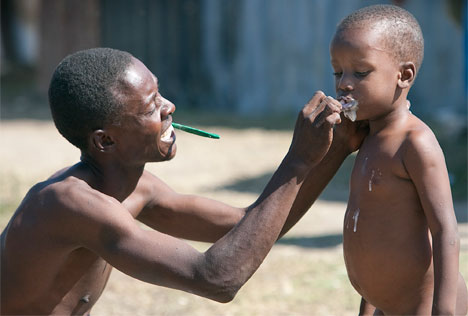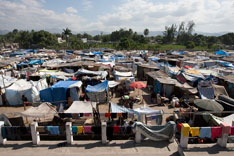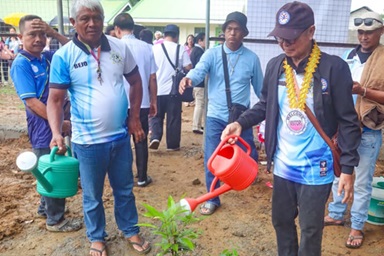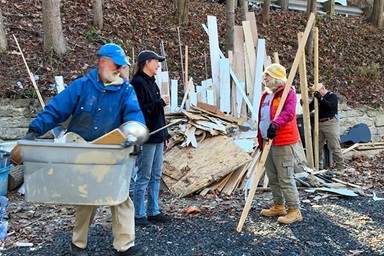
A father helps his son with basic hygiene at the camp where they are staying in Leogane, Haiti. UMNS photos by Mike DuBose.
A soccer field has become home to more than 5,000 traumatized Haitians here. It is one of many makeshift communities tucked in every corner of the city and in open fields in the outlying areas.
A massive earthquake Jan. 12 shook more than 400,000 people from the safety of their homes. Home doesn't mean safe anymore.

More than 5,000 Haitians live in the makeshift camp at Leogane's municipal soccer stadium.
The communities can't really be called tent cities because most of the people don't have any kind of shelter. Wooden poles covered by sheets provide a little respite from the hot sun during the day.
Families hang their laundry to dry on the bleachers and on top of chain-link fences. Women wash clothes in large tin pots, cook on open flames, and watch as children run and play in the narrow spaces between the shelters.
Some comforts from home have made their way here. A young couple walks into the camp carrying a wooden door. An old, worn chair looks oddly out of place.
The people have designated a place between two cars as the public shower. An elderly man stands wrapped in an orange towel, using the side mirrors of one of the cars to shave.
A group of Haitian medical doctors and nurses operates a clinic, set up in a corner of the field. A pharmacist says he took all of the drugs from his store and brought them to the field for the medical team to use. Today, the Angel Medical Center from Western North Carolina is lending a hand. The Haitians say occasionally a team will stop and help for a few hours or a few days.
Being homeless doesn't stop families from being families.
A father leads his young son to the "shower." Gently he brushes his child's teeth, washes his body and softly talks to him. For a moment, he is able to block out all the noise and upheaval.
It is the sweetest moment of my day.
*Gilbert is a news writer for United Methodist News Service on assignment in Haiti.
News media contact: Kathy Gilbert, Nashville, Tenn., (615) 742-5470 or [email protected].
Video
UMNS on Facebook: Haiti Arrival
Slideshow
Haiti Jan. 21-24: UMCOR, Border, Port-au-Prince, Leogance, Gressier
Resource
Like what you're reading? Support the ministry of UM News! Your support ensures the latest denominational news, dynamic stories and informative articles will continue to connect our global community. Make a tax-deductible donation at ResourceUMC.org/GiveUMCom.




